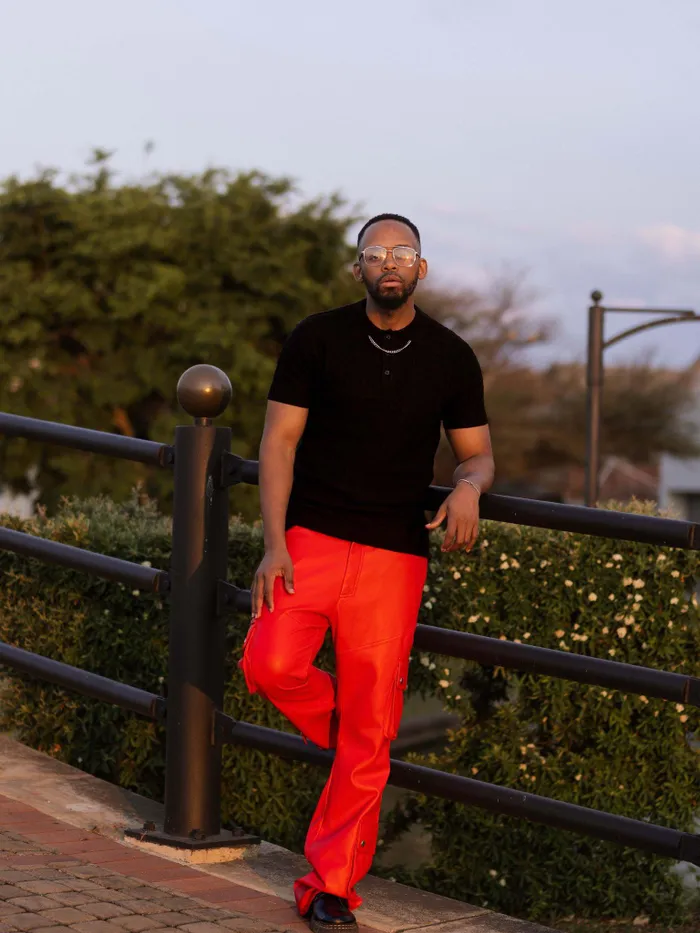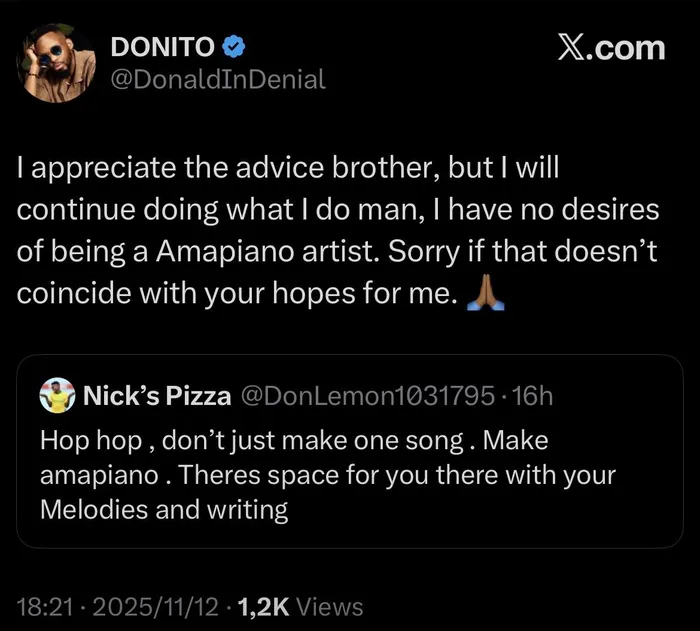
"I appreciate the advice brother, but I will continue doing what I do man, I have no desires of being a Amapiano artist. Sorry if that doesn't coincide with your hopes for me."
Image: X
There’s been a buzz online lately of fans asking, “What happened to Donald?”
Every era has its own soundtrack songs that define who we were, what we felt, and how we lived. For many South Africans, the early 2010s belonged to Donald.
His smooth vocals, timeless hits like "I Deserve" and "Over the Moon", and that signature red suit era had us all in a collective chokehold.
He was the heartbeat of local R&B and proof that soulful music could still rule the charts.
In a fresh and frank post on X, Donald shut down suggestions that he’d faded away:
“I’ve been seeing so many comments of ‘What happened to Donald’ … the fact that you don’t see much of what I’m doing doesn’t mean I’m not doing anything. PS: I have never taken a break. I’m a working artist and continue to do that every day of my life.”
It’s a story as old as pop culture: an artist conquers their youth, has their “definitive era”, and then… something changes.
The industry and you are evolving. The award-winning artist recently faced social media chatter questioning, "What happened to Donald?", he decided it was time to address the rumours and set the record straight.
It’s not a dig. That's a legitimate and curious question, one that many artists of his generation are forced to face in the streaming age. We are in a time when visibility often equals relevance; it’s easy to assume that what doesn’t trend simply doesn’t exist. But that couldn’t be further from the truth.
The music scene isn’t what it was a decade ago. Back in 2012, Donald’s "Train of Love" album dominated every radio station, taxi rank, and wedding dance floor in South Africa, an era when connection with fans wasn’t filtered through algorithms or TikTok trends.

"I’m a working artist and continue to do that everyday of my life"
Image: X
Fast-forward to 2025, and the rhythm has changed. Amapiano leads global charts, social media virality drives discovery, and attention spans are measured in seconds.
Gen Z’s music consumption is fast, visual, and social, making longevity a tougher game. Yet, artists like Donald, who built their careers on artistry rather than algorithms, continue to evolve, finding new ways to stay connected without losing authenticity.
“I realised just how some people have not fully grasped how different the industry is now, the Algorithm is a new thing, the fact that you don’t see much of what I’m doing doesn’t mean I’m not doing anything,” he explained.
And he has been explicit in how much he has no desire to pivot to the Amapiano genre. Replying to the now viral tweet, " I appreciate the advice, brother, but I will continue doing what I do, man, I have no desires of being an Amapiano artist. Sorry if that doesn't coincide with your hopes for me," he replied on X.
Here’s the thing: Donald hasn’t been idle. In February, thirteen years after his 2012 classic, Donald released "Train of Love 2".
This sequel bridges his signature sound with new-age R&B. The album features collaborations with younger talents like Nati and Manana, proving he’s not just adapting to change but embracing it.

Multi-award winning and platinum selling artist Donald Moatshe Multi-award winning and platinum selling artist Donald Moatshe
Image: X
In March 2024, he celebrated 15 years as a solo artist with national tour stops, intimate shows, and upcoming masterclasses aimed at “uplifting and guiding” the next generation of South African artists.
“It’s important to give back,” he told fans during one event. “The industry needs more mentorship, not competition.”
Recent singles like "Mmele Pelo Le Moya", "Khwezela", "Vula" and "Take Me to My Love" (featuring DJ Khyber) show that his pen game and vocal ability remain as smooth as ever; they just live in a different musical ecosystem.
Perhaps what’s most fascinating about Donald’s story isn’t just that he’s still making music; it’s what it says about us as listeners.
Every generation believes its music era was “the best”. Baby Boomers had Bra Hugh Masekela and Miriam Makeba. Millennials danced to Liquideep, MiCasa, and Mafikizolo. Today’s Gen Z lives for Amapiano, Afro-fusion, and the rhythm of the algorithm.
Music has always evolved with culture, from vinyl records and radio to streaming and social media virality. The ways we discover artists have changed, but music’s power to connect us hasn't.
Donald has already flagged upcoming moves. He’s spoken warmly of rising stars like Naledi Aphiwe & Mawelele on social media, saying:
“Guys, Naledi & Mawelele are changing our music scene right in front of our eyes, and I feel like we haven’t woken up to it yet.”
This dual role of legendary artist, mentor, and observer of the new wave is what keeps the story interesting.